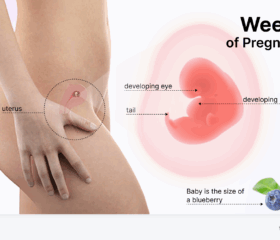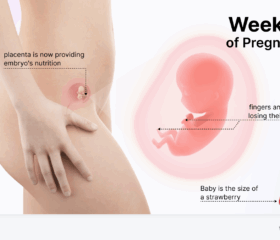First Trimester of Pregnancy: Baby, Symptoms, and Tips
Welcome to the first step of your pregnancy marathon! Brace yourself for a lot of excitement—and a lot of moments when you’ll ask, “Is this normal?”

- What exactly is the first trimester?
- What are the early signs that you’re pregnant?
- How can you manage common first-trimester symptoms?
- How will your baby grow during the first trimester?
- How should you prepare for the first trimester?
- What should you eat during the first trimester?
- How much weight will you gain in the first trimester?
- What activities are safe and unsafe in the first trimester?
- How to take care of your mental health during the first trimester
- Final thoughts
Even before you see that positive pregnancy test, your body will undergo many changes as it lays the foundation for new life. Here’s what you need to know about surviving these first few months.
What exactly is the first trimester?
The first trimester refers to the initial three months (weeks 1–12) of your pregnancy, beginning from the first day of your last menstrual period (LMP). The first two weeks of your pregnancy are part of your menstrual cycle, so you’re technically not pregnant yet during them. 1
Doctors use this method of counting the weeks of pregnancy because it’s usually hard to pinpoint the exact date you conceived. It’s easier to just count from the date your last period began.
What are the early signs that you’re pregnant?
Missing a period is usually the first pregnancy symptom for a lot of women. However, there are other reasons this can happen, so you’ll need to take a pregnancy test to confirm.
Your hormonal fluctuations can bring about several other early symptoms of pregnancy, such as: 2 3
- Morning sickness: Nausea and vomiting affect 70–80% of all pregnant women and can strike at any time of day, not just in the morning. 4
- Swollen breasts: Your breasts may feel sore, heavy, or even tingly. Try out a supportive bra and use cold compresses or ice packs.
- Fatigue: You might feel unusually tired after you conceive due to a hormone called progesterone, which supports the growth of your baby and your breasts’ milk-producing glands. Unfortunately, pregnancy fatigue is a common side effect of these hormonal changes.
- Frequent urination: You may find that you need to pee more often than usual. You can blame this on the pregnancy hormone human chorionic gonadotropin (hCG), which increases blood flow to your pelvic area.
- Mood swings: Your emotions may be all over the place, leaving you feeling happy one moment and distressed the next. This is natural, and it will pass. You may experience these mood swings as early as a few weeks after conception (the period between weeks 6 and 10 is usually when pregnancy mood swings start).
- Spotting or light bleeding: About 25% of women experience a type of early-pregnancy spotting called implantation bleeding about 6 to 12 days after conceiving, when the fertilized egg attaches to the uterine lining. You might see pink or brown discharge (not clots or period flow) for a few hours to two days. 5
- Bloating and constipation: Your digestive system may slow down, causing bloating during your pregnancy. Many women also suffer from constipation in the early days.
- Food cravings and aversions during pregnancy: You may suddenly crave certain foods or, conversely, feel disgusted by foods you used to love. Pregnancy cravings and aversions can start early on, though they may come and go throughout pregnancy.
On top of these common symptoms, you might also experience heartburn, dizziness, and fainting.
Remember that every woman experiences pregnancy differently. You may have a multitude of symptoms or very few. Don’t be alarmed if your experience doesn’t line up with what you’ve heard from others.
Keep track of what you’re experiencing in your journal or a pregnancy tracker app so that you can chat with your doctor if you have any concerns about your symptoms (or lack thereof).
How can you manage common first-trimester symptoms?
First-trimester pregnancy symptoms are usually no picnic. Fortunately, you can manage a lot of them with a few simple lifestyle changes:
Diet
The first trimester is notorious for morning sickness. Managing your nausea and vomiting—and even heartburn—often comes down to changing your eating habits.
Eat smaller pregnancy-friendly snacks every two to three hours instead of three larger meals. Choose bland, easily digestible foods like crackers, toast, and plain yogurt when you’re feeling queasy.
Ginger can also alleviate nausea, so try ginger tea, ginger ale (non-alcoholic, of course), or ginger candies. 6 Talk to your doctor about safe medications if your morning sickness is severe.
If you experience food aversion, avoid strong smells and trigger foods that worsen your nausea. Avoiding spicy, fatty, greasy, and acidic foods also helps with heartburn.
If you’re constipated, stay hydrated and add plenty of fiber to your pregnancy diet in the form of fruits, vegetables, and whole grains.
Rest
In addition, try getting plenty of rest. If you’re used to only sleeping six hours a night, be prepared for that to change—you might have to sleep nearly twice as long at the beginning of your pregnancy. 7
The usual recommendation is to get eight to ten hours, which lowers your risk of preeclampsia, long labor, gestational diabetes, preterm delivery, and needing a C-section. If you don’t get enough sleep, your baby may weigh less than he should due to intrauterine growth restriction (IUGR). 8
How will your baby grow during the first trimester?
While you might not look pregnant yet, your baby is busy developing: 9 10 11
Weeks 1–4
As mentioned, conception happens around the end of the second week, when the sperm fertilizes the egg (which is then called a zygote). It divides into multiple cells as it travels down the fallopian tube.
Once it reaches your uterus, it implants into the lining and forms a cluster of cells called a blastocyst, which is about the size of a poppy seed.
The blastocyst forms two layers, one of which will eventually become your baby. The other will form the placenta. At this point, the early development of your baby’s heart, spinal cord, and brain begins.
Week 5–8
In weeks 5–6, your baby’s heart develops enough to start beating, usually reaching more than 100 bpm by week six. 12 You might be able to hear his pulse during a vaginal ultrasound.
His brain and spinal cord are growing. All his major organs (heart, lungs, kidneys, liver, and intestines) are taking shape, though they’re not fully developed yet. He might sprout tiny buds, which will become his arms and legs.
He now has a more recognizable head, with his eyes (still closed), ears, and head more developed. Finally, his bones harden, and his genitals form.
Week 9–12
By the end of the third month, your baby has more identifiable facial features and limbs. There’s no more webbing between his fingers—they look more like real limbs than paddles—and they’re growing nails, along with his little toes.
His organs, bones, and muscles are more apparent, too, but his skin is still see-through. His teeth and taste buds form, and his knees, elbows, and ankles now work. Still, you’ll need to wait a bit longer before you can feel him kicking.
Your doctor won’t be able to determine your baby’s sex on an ultrasound just yet, but he already has one. However, you may be able to hear his heartbeat with a fetal Doppler ultrasound (although this is rare).
Your baby also now has a fully functioning urinary system, along with developed circulatory and digestive functions. His kidneys work, too, and his liver can even produce bile. He looks more like a newborn, though he’s still very small (about 2.5 inches long).
After week 12 of your pregnancy, you’re a lot less likely to have a miscarriage, and you may start feeling relief from your morning sickness. 4
How should you prepare for the first trimester?
You should seek prenatal care and schedule your first pregnancy appointment as soon as you suspect you’re pregnant. To find a reputable OB-GYN, ask your primary care doctor for recommendations, check your insurance provider’s website for in-network doctors, and research potential candidates online to evaluate their credentials and patient reviews.
Prenatal testing
At your OB-GYN’s office, you’ll probably need a blood or urine test to check for hCG, followed by a physical exam and a pregnancy ultrasound to assess your baby’s gestational age, development, and overall health.
An ultrasound will help them determine whether you’re at risk of different types of miscarriage or pregnancy loss by making sure the pregnancy is developing where it should be—for example, in the uterus, as opposed to outside of it (an ectopic pregnancy).
You should do some research on genetic testing. Your doctor will discuss screening options, such as first-trimester screening (FTS), non-invasive prenatal testing (NIPT), and nuchal translucency screening, also known as an NT scan.
These tests help your doctor assess your baby’s risk of chromosomal abnormalities, such as Down syndrome, Edwards syndrome (trisomy 18), and Patau syndrome (trisomy 13). 13
Your doctor will also chat with you about your medical history, past procedures, medications, and any concerns you have that could put your health and your baby’s at risk.
The importance of prenatal vitamins
After your comprehensive appointment, your doctor will recommend prenatal vitamins, although ideally, you should begin taking them even before you conceive.
These supplements include about 400 mg of folic acid, which is particularly important to prevent defects in your baby’s neural tube (which will later become his brain and spinal cord), like spina bifida and anencephaly. 14 15
Remember to review your insurance plan’s coverage for prenatal care, delivery, and newborn care.
Break your prenatal vitamins in half to make them manageable
Unfortunately, nausea is one of the side effects of prenatal vitamins. To reduce discomfort, split your vitamins in half and take each half at different times during the day, such as in the morning and then in the evening.
What should you eat during the first trimester?
You don’t need to worry about eating extra just yet. Instead of quantity, focus on the quality of your diet.
Focus on nutritious foods, like fruits, vegetables, whole grains, lean proteins, and healthy fats. A well-rounded diet ensures that you get all the nutrients you need during pregnancy and prevents complications like gestational diabetes, preterm birth, obesity-related complications, preeclampsia, and high blood pressure. 16 17
As mentioned, you should also take your prenatal vitamins to boost your folic acid intake. They also contain iron, calcium, and vitamin D.
You should get about 30 mg of iron a day to meet your growing baby’s demands and avoid anemia and fatigue. 18 This also lowers your risk of premature birth and low birth weight.
You need about 1,000 mg of calcium a day to reduce your risk of preeclampsia and build up your baby’s bones and teeth. Vitamin D also supports the development of your baby’s teeth and bones. Aim for 600 IU (international units) of it daily. 19 17
Alongside your diet, stay hydrated. Drink about 8–12 cups (64–96 ounces) of water throughout the day. Drinking enough water is also a great way to combat constipation. 20
What foods should you avoid?
As well as adding healthy foods to your diet, you’ll also need to avoid certain foods during pregnancy.
Steer clear of raw or undercooked meat, poultry, eggs, and seafood (sorry, sushi lovers—that means you can’t eat sushi containing raw fish while you’re pregnant). This is necessary to avoid harmful bacteria and parasites like Toxoplasma gondii. This foodborne parasite can cause your baby to have visual and hearing impairments, as well as intellectual disabilities. 21
You should also avoid hot dogs and cold cuts (deli meats) like pepperoni, spam, sausages, turkey, and chicken breast during pregnancy. However, you can still eat deli meats while pregnant if you reheat them until they’re steaming hot first. You should also avoid: 22 23 24
- Ice cream
- Unpasteurized dairy products and juices
- Soft cheeses with a mold rind (like camembert and brie) and blue cheese (though you can still eat many kinds of pasteurized cheese while pregnant)
- Refrigerated smoked seafood
- Unwashed fruits and vegetables
These foods can contain listeria, which can cause miscarriage, stillbirth, and lifelong complications for your baby, like intellectual disabilities and problems with his vision, heart, and kidneys. (On that note, make sure you keep an eye out for symptoms of listeria during your pregnancy, like fever, fatigue, and muscle aches.)
Cut fish with high mercury concentrations from your diet, like swordfish, shark, and king mackerel. Mercury increases your baby’s chance of brain damage and developmental delays. However, pregnant women can eat canned tuna (as long as it isn’t bigeye tuna), salmon, and cooked shellfish, which have relatively low mercury concentrations. 25 26
How should you prepare your food?
To reiterate, you should wash your produce before using it. Be mindful of any harmful endocrine-disrupting chemicals (EDCs) that increase your chances of miscarriage, such as pesticides, parabens, phthalates, and bisphenols (BPA, BPS, BPF).
You can limit your chances of exposure by eating less processed and prepackaged food and by minimizing your use of plastic while drinking, eating, or heating food. 27
What other foods and drinks should you avoid during pregnancy?
While you can still drink coffee when you’re pregnant, keep your caffeine consumption to 200 mg per day (or one twelve-ounce cup of coffee, one can of cola, or two bars of plain chocolate). 28 29
Alcohol, on the other hand, is a different story. You’ll need to avoid alcohol entirely while you’re pregnant. Alcohol can lead to pregnancy loss, preterm labor, and fetal alcohol spectrum disorders (FASDs), which result in physical, learning, and behavioral issues. 30 31
How much weight will you gain in the first trimester?
You might gain up to five pounds or no weight at all, depending on your body mass index (BMI) before you got pregnant. 32 Most of your weight gain will probably happen in the second and third trimesters.
Will your baby bump show in the first trimester?
Usually, no—your baby bump will probably become more prominent in the second trimester, with most women starting to show between week 16 and week 20 of pregnancy. 33
However, the shape and size of your bump will depend on your body type, age, muscle tone, and pregnancy weight gain. It also depends on whether you were ever pregnant before and how your baby is positioned in the womb.
What activities are safe and unsafe in the first trimester?
Most women can continue working during the first trimester unless their job involves especially strenuous physical activity or exposure to hazardous substances, radiation, or toxins. Be careful if you work in healthcare, law enforcement, construction, manufacturing, or farming.
Can you travel during the first trimester?
Talk to your doctor about your travel plans. Generally, travel—even through the air—is safe during the first trimester, but you need to take precautions to prevent blood clots and dehydration. Make sure you get up and stretch your legs at least once every hour, and drink lots of fluids. 34
What activities should you avoid during pregnancy?
Now that you’re pregnant, there are many things you can no longer do. Even in these early stages, certain everyday activities can be risky for your developing baby.
As an example, don’t clean your cat’s litter box. Cat feces can contain Toxoplasma gondii, a parasite that’s particularly dangerous for pregnant women.
To avoid it, you should also wear gloves while gardening or touching any outdoor places where cat feces can be found. As always, wash your hands thoroughly and frequently.
Moreover, smoking—or being exposed to secondhand smoke—and drug use can lead to premature delivery, bleeding, and low birth weight. Your baby may also be at a higher risk for birth defects, behavioral or learning problems if you smoke while pregnant. 35 36
Is it safe to exercise during the first trimester?
Normally, gentle exercise is safe—and even recommended—during pregnancy. Focus on moderate-intensity aerobic activity for at least 30 minutes five days a week. Try brisk walking, light yoga, or water aerobics to reduce your risk of excessive weight gain and gestational diabetes. Exercise also alleviates symptoms of postpartum depression and postpartum rage. 37
However, skip activities with a high risk of injury, falling, overheating, or reducing your oxygen intake, like contact sports, high-impact exercises, hot yoga, scuba diving, or high-altitude skiing. 38
To avoid overheating, dehydration, and fainting, you should also take a break from hot tubs, saunas, and steam rooms. 39
How to take care of your mental health during the first trimester
Pregnancy can be an emotional rollercoaster. Give yourself time to process whatever you’re feeling—joy, excitement, anxiety, fear—without judgment.
Lean on your support group, whether it’s your partner, friends, or family. Share your struggles with those you trust to ease some of that emotional toll, and get them to help out with chores when you’re feeling overwhelmed.
Consider joining a support group for moms-to-be. You can learn a lot from other expectant or experienced moms. They’ll know all about dealing with morning sickness and doctor’s visits—and everything unexpected in between.
Learn how to relax. You can practice a few relaxation techniques like deep breathing, meditation, and yoga. Make time for your hobbies and other activities that you enjoy, whether that be reading, listening to music, or going for walks in nature.
You could even treat yourself to a relaxing prenatal massage (as long as you go to a certified massage therapist that’s trained to give them).
If you’re struggling with persistent sadness, anxiety, or other mental health issues, don’t hesitate to reach out to a therapist or counselor.
Final thoughts
The first trimester won’t necessarily be an easy start to your nine-month marathon. However, you’ll be pleased to know that your symptoms should ease up once you reach the second trimester.
For now, start building those healthy habits, attend your prenatal checkups, and keep in close contact with your doctor each step of the way.
Article Sources
- Better Health Channel. "Baby due date" Retrieved May 16, 2025.
- Eunice Kennedy Shriver National Institute of Child Health and Human Development. "What are some common signs of pregnancy?" Retrieved May 16, 2025.
- The Women's. "Common concerns in early pregnancy" Retrieved May 16, 2025.
- Gastroenterology Clinics of North America. "Nausea and Vomiting of Pregnancy" Retrieved May 16, 2025.
- Cleveland Clinic. "Implantation Bleeding" Retrieved May 16, 2025.
- University of Rochester Medical Center. "Nausea and Vomiting During Pregnancy" Retrieved May 16, 2025.
- Johns Hopkins Medicine. "First Trimester Fatigue" Retrieved May 16, 2025.
- Cleveland Clinic. "Pregnancy Insomnia" Retrieved May 16, 2025.
- American College of Obstetricians and Gynecologists. "Changes During Pregnancy" Retrieved May 16, 2025.
- Cleveland Clinic. "Fetal Development" Retrieved May 16, 2025.
- UI Health. "You and Your Baby: Month-By-Month" Retrieved May 16, 2025.
- March of Dimes. "Pregnancy Week by Week" Retrieved May 16, 2025.
- Johns Hopkins Medicine. "First Trimester Screening, Nuchal Translucency and NIPT" Retrieved May 16, 2025.
- Folic Acid and Pregnancy. "Nemours KidsHealth" Retrieved May 16, 2025.
- American College of Obstetricians and Gynecologists. "Nutrition During Pregnancy" Retrieved May 16, 2025.
- Frontiers in Nutrition. "How the intricate relationship between nutrition and hormonal equilibrium significantly influences endocrine and reproductive health in adolescent girls" Retrieved May 16, 2025.
- The Moore Institute. "The Importance of Nutrition in Pregnancy and Lactation: Eat Better, Not More" Retrieved May 16, 2025.
- The University of Texas Southwestern Medical Center. "Why women should ‘pump iron’ supplements during pregnancy" Retrieved May 16, 2025.
- MedlinePlus,. "Pregnancy and Nutrition" Retrieved May 16, 2025.
- American College of Obstetricians and Gynecologists. "How much water should I drink during pregnancy?" Retrieved May 16, 2025.
- U.S. Food and Drug Administration. "Toxoplasma (Food Safety for Moms-to-Be)" Retrieved May 16, 2025.
- American College of Obstetricians and Gynecologists. "Listeria and Pregnancy" Retrieved May 16, 2025.
- U.S. Food and Drug Administration. "Listeria (Food Safety for Moms-to-Be)" Retrieved May 16, 2025.
- National Health Service. "Listeriosis" Retrieved May 16, 2025.
- Better Health Channel. "Mercury in fish" Retrieved May 16, 2025.
- Centers for Disease Control and Prevention. "Mercury and Breastfeeding" Retrieved May 16, 2025.
- Your Fertility. "How to avoid chemicals that can reduce fertility" Retrieved May 16, 2025.
- American College of Obstetricians and Gynecologists. "How much coffee can I drink while I'm pregnant?" Retrieved May 16, 2025.
- Tommy’s. "Limiting your caffeine intake in pregnancy" Retrieved May 16, 2025.
- Centers for Disease Control and Prevention. "Alcohol Use Effects on Men's and Women's Health" Retrieved May 16, 2025.
- Morbidity and Mortality Weekly Report. "Alcohol Use, Screening, and Brief Intervention Among Pregnant Persons" Retrieved May 16, 2025.
- American College of Obstetricians and Gynecologists. "How much weight should I gain during pregnancy?" Retrieved May 16, 2025.
- Duke Ob/Gyn Care Coach. "16-20 Week Education" Retrieved May 16, 2025.
- Mount Sinai. "Pregnancy and travel" Retrieved May 16, 2025.
- Centers for Disease Control and Prevention. "Health Effects of Cigarettes: Reproductive Health" Retrieved May 16, 2025.
- Nemours KidsHealth. "Recreational Drugs and Pregnancy" Retrieved May 16, 2025.
- Centers for Disease Control and Prevention. "Physical Activity Recommendations for Pregnant and Postpartum Women" Retrieved May 16, 2025.
- Johns Hopkins Medicine. "Exercise During Pregnancy" Retrieved May 16, 2025.
- National Health Service. "Health things you should know in pregnancy" Retrieved May 16, 2025.







